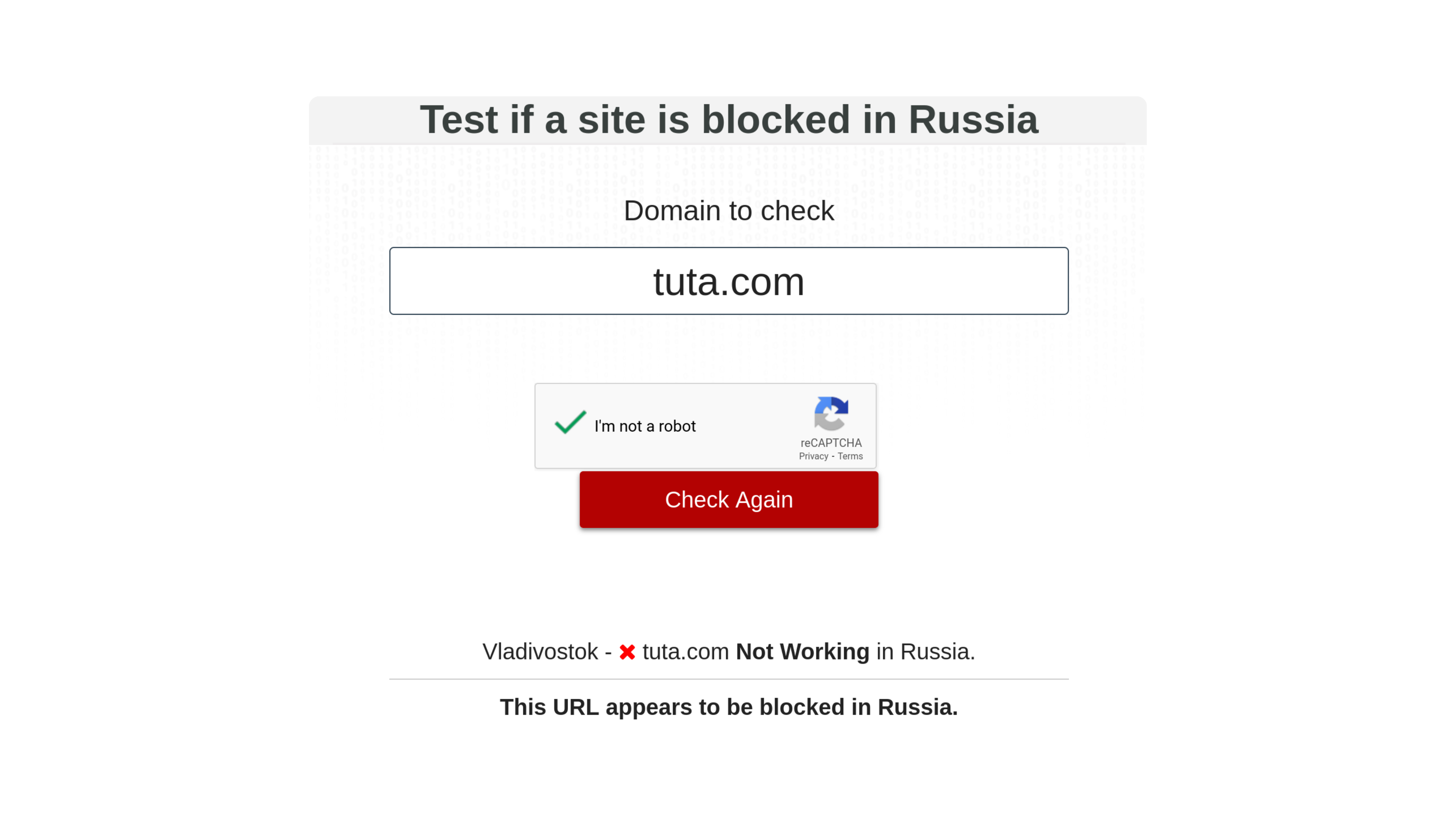Open Letter to Russia against blocking of encrypted apps like Tuta Mail, Signal & WhatsApp
Tuta(nota) was blocked in Russia in 2020, Signal in 2024, and next up is WhatsApp. We are standing up to stop Russia from building a surveillance state like China.
Russian authorities are escalating their crackdown on encrypted communication by moving to block WhatsApp, after already banning Signal last year, and Tuta Mail in 2020. What’s more, all phones sold in Russia must come with a pre-shipped installation of the Russian app “Max”, which has been criticised heavily as its sole purpose is to control Russian citizens.
These actions by Roskomnadzor directly violate internationally recognized human rights, including freedom of speech, access to information, and privacy.
This crackdown is part of Russia’s strategy to impose “digital sovereignty” by replacing global, secure apps with state-controlled alternatives.
The Russian authorities are now also planning to block VPNs - tools which are essential for bypassing the censorship of encrypted apps. This leaves Russian citizens with very little options for safe communication. These restrictions put millions of people, including journalists, activists, and whistleblowers, at risk by stripping away their right to privacy and secure access to information.
Russia has blocked Tuta(nota) since 2020
As the OONI Explorer - a tool to demonstrate censorship online - shows, Tuta Mail is blocked in parts of Russia, starting beginning of 2020. Tutanota (now Tuta Mail), one of the leading encrypted email providers worldwide, is also listed in the registry of blocked sites provided by Russian activists.
An act against encryption
Encrypted communication is a thorn in the side to authoritarian governments like Russia. Encryption makes it impossible for the government and its secret services to eavesdrop on citizens and to control the opposition. The current blocking of Tuta Mail, Signal, and other apps is an act against encryption and confidential communication in Russia.
Tuta(nota) has also been blocked in Egypt since October 2019.
Access via Tor or VPN
People who need secure communication in Russia and Egypt can still access Tuta Mail, Signal, and other blocked apps and websites by using the Tor browser or a VPN. However, the option to use a VPN is limited more and more as the authorities have also started blocking these services.
We at Tuta condemn the blocking of encrypted apps. It is a form of censorship of Russian citizens who are now deprived of yet another secure communication channel online. At Tuta we fight for our users’ right to privacy online, also, and particularly, in authoritarian countries such as Russia and Egypt.
Censorship and Freedom of Speech
Censorship online is often used to stop freedom of speech. In many democracies free speech is protected by the constitution. This is the case in Germany and in the USA, for example. In these countries, it is very difficult - if not impossible - for state actors to limit access to information or communication tools online.
In other countries, for example in China, Russia and Egypt, it is common that state actors stop or throttle access to unwanted information or communication tools. But even if common, we must not remain silent about it.
Please read our open letter to defend encryption in Russia below!
Open Letter against blocking of encrypted services in Russia
The undersigned entities, organizations, and individuals write to express our urgent concerns regarding escalating efforts by Russian authorities to block access to end-to-end encrypted communication platforms, such as WhatsApp, following last year’s blocking of Signal. These actions by the Federal Service for Supervision of Communications, Information Technology and Mass Media (Roskomnadzor) violate internationally recognized human rights, including the rights to freedom of opinion and expression, access to information, and privacy.
Encrypted services are lifelines, recognized by the UN and international human rights experts as critical enablers of secure communication and democratic participation. They enable journalists, human rights defenders, activists, and ordinary people to communicate without fear of surveillance, censorship, or retaliation. Eliminating access to these services undermines fundamental rights to privacy and freedom of expression, and threatens the safety of millions of users who rely on encryption for secure communication.
These latest restrictions are part of a broader effort by the Kremlin to enforce “digital sovereignty” by asserting increasingly inappropriate and excessive authority over the provision of digital services, while simultaneously supporting the development of and reliance on state-controlled platforms. In addition to throttling and blocking global services, the Russian government has ordered that a government-backed, non-encrypted messenger called Max be pre-installed on all mobile phones and tablets sold in the country. Integrated with government services and launched by the state-controlled company VK, Max cannot provide the same protections as end-to-end encrypted services.
Similarly, Russia blocks the use of many virtual private networks (VPNs), tools that provide essential, lawful means for individuals to realize their rights by bypassing censorship and protecting their privacy. Restricting both encrypted communication platforms and VPNs leaves people in Russia with exceedingly few options for secure communication.
In this context, we:
- Condemn Russia’s blocking of end-to-end encrypted messaging applications and the forced pre-installation of unencrypted alternatives that do not confer the same level of protection for privacy and free expression;
- Reaffirm the critical importance of encryption and VPNs in enabling access to information, facilitating secure communications, and resisting unlawful surveillance.
- Support efforts by companies, civil society, and multistakeholder initiatives to maintain and expand access to encrypted communication services for people in Russia and around the world.
- Commit to helping people resist pressures to adopt similarly restrictive measures in other jurisdictions, recognizing the global risks of normalizing such practices.
The blocking of encrypted services in Russia, combined with the mandatory deployment of non-encrypted state-controlled apps, should be understood as part of a wider campaign against human rights, rather than isolated acts of regulation. If unchallenged, these tactics risk setting a dangerous precedent for digital authoritarianism elsewhere. The international community must respond with clarity and resolve: free, private, and secure communication is not a privilege, but a fundamental right that must be protected everywhere.
We stand in solidarity with those in Russia whose voices are being silenced, and will continue to defend encryption, VPNs, and the open internet as essential pillars of freedom in the digital age.
Sincerely,
Civil Society Organizations
Advocacy For Principled Action In Government
Africa Rural Internet and STEM Initiative - AFRISTEMI
ARTICLE 19
Chayn
Center for Democracy & Technology
Center for Online Safety and Liberty
Electronic Frontier Foundation (EFF)
Emerald Onion
Encryption Advocates Council
Fight for the Future
Global Network Initiative
Global Partners Digital
Human Rights Journalists Network Nigeria
Index on Censorship
Internet Society Catalan Chapter (ISOC-CAT)
JCA-NET(Japan)
LGBT Tech
Surveillance Technology Oversight Project (S.T.O.P.)
Success Bridge Community Development Foundation
The Tor Project
World Ethical Data Foundation
Zaina Foundation
Corporations and Trade Associations
Nord Security
Tuta Mail
Cybersecurity Experts and Academics*
Prof. Jordi Domingo-Pascual, Universitat Politècnica de Catalunya (UPC BarcelonaTECH)
Sofia Celi, Brave / University of Bristol
Riana Pfefferkorn, Stanford University
Dr. Sanjana Hattotuwa
Dr Jean Linis-Dinco
Dr. Preeti Kamra
Vyara Savova, EUCI/UniBit
*Affiliation is indicated for purposes of identification only.


